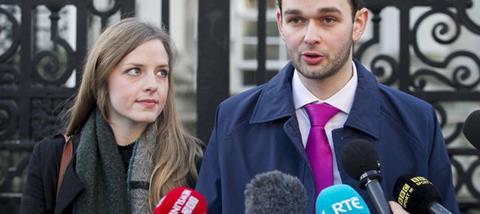
The Court of Appeal in Belfast has just finished hearing four days of arguments in what has become known as the ‘gay cake’ case.
Ashers Baking Company, supported by the Christian Institute, are seeking to overturn a decision by the County Court which found they had discriminated in declining to ice a cake with the slogan ‘Support Gay Marriage’. At the heart of the case are questions of freedom religion and expression.
This may seem like a small dispute between a business and one of their clients. But what is at stake here is actually far greater. The outcome of this appeal will set a precedent for the future. Our society is trying to understand where the line is between a Christian's right to their religious freedom and their duties under the law and as business owners.
It is two years almost to the day since the infamous cake was ordered, so here's a reminder of the case so far. Mr Lee had used the bakery before, and the company was, and remains, happy to serve him. However, the McArthur family which owns the business were not happy to promote a view contrary to their religious beliefs. As Ashers’ barrister said time and again during the original hearing, 'It was the content of the cake, not the characteristics of the customer, that were critical to their decision.'
This is an important case which is being heard by a panel of three judges including the Lord Chief Justice of Northern Ireland. It is also a complex legal case involving alleged direct and indirect discrimination on the grounds of sexual orientation, religious belief and political opinion, European Convention rights as well as legalisation unique to Northern Ireland. Both sides have cited US and Canadian decisions and the case is being followed around the world.
It was the content of the cake, not the characteristics of the customer, that were critical to [Ashers'] decision
The Equality Commission say that Ashers discriminated on the grounds of sexual orientation. The judge at the lower court concluded that, 'support for same sex marriage was indissociable from sexual orientation.' However, Ashers are clear that they did not know Mr Lee’s sexual orientation and, as most people who support same sex marriage are heterosexual, ordering the cake did not mean Mr Lee was gay. They would not have made a cake with that slogan for anyone gay or straight.
It is also notable that Ashers were happy to put the Queerspace logo on a cake - it was the slogan supporting gay marriage that was the issue. Simply put, in the view of Ashers’s legal team, this case has nothing to do with the sexual orientation of the person ordering the cake.
The Attorney General has recently intervened in the case arguing that it is primarily about freedom of expression. In submissions he noted, 'the case for Mr Lee is put with the appearance of sweet reasonableness but it cannot be disguised that Ashers are being compelled, on pain of civil liability, to burn a pinch of incense at the altar of a god they do not worship.' He suggested the words intended for the cake amount to a theologically loaded expression of a lawful political opinion. He made the case that religious beliefs and political opinion have special protection under the Northern Ireland constitution and therefore take precedence over other grounds such as sexual orientation.
If this appeal is lost, freedom of conscience and religion will effectively be banished from the public square
The Equality Commission have acknowledged that there are competing rights to be balanced. While they acknowledge that the owners of Ashers have genuine and deeply held religious beliefs, they argue that Mr Lee’s right not to be discriminated against trumps this.
There has been discussion of the idea of ‘reasonable accommodation’ which is gaining currency in North America. The Attorney General has noted that Mr Lee could easily have ordered the cake elsewhere, as he did, whereas Ashers either had to the make the cake against their will or face court. Against this the Commission have appealed for legal certainty - Mr Lee and others must be able to go into a shop and know they will be served.
Judgment has been reserved with no indication of when we can expect it. If this appeal is lost, freedom of conscience and religion will effectively be banished from the public square. This case is not about special protection for Christians. The mark of a free and democratic society is that competing views are discussed and debated. Forcing someone to promote a view that they fundamentally disagree with is the antithesis of a free and fair society. People have compared this case to the example of a Muslim printer being asked to print a cartoon of the prophet Mohammed. Surely we would defend the right of that Muslim to refuse to print such an image because it goes against his or her sincerely held religious beliefs?
Defeat would be a step towards an Orwellian situation where the Equality Commission decides which political and religious views are acceptable and which are not. The Chief Commissioner has already said that Christians should, 'either look at the law or maybe that (baking) is not the business they should be in.' His suggested solution that Christians stay out of certain occupations is worrying and dents confidence in the Commission.
We must hope and pray that the Court of Appeal places a higher value on freedom of religion than the lower court.
Peter Lynas is a former barrister and NI director of the Evangelical Alliance
Click here to request a free copy of Premier Christianity magazine



























